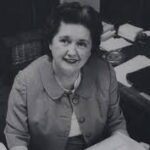Frances FitzGerald: 6 Key Insights into the Life and Legacy of a Pulitzer Prize-Winning Journalist
Introduction:
Frances FitzGerald is one of America’s most distinguished journalists, whose contributions have had a lasting impact on the way we understand history, war, and politics. Best known for her in-depth reporting and award-winning books, FitzGerald’s work continues to resonate today, providing an insightful lens into American society and global politics. In this article, we delve into the life and career of Frances FitzGerald, exploring her biography, the daily life impacts of her work, and the significance of her contributions to society.
Early Life and Education
Frances FitzGerald was born on January 16, 1940, in New York City, into a family with deep roots in American journalism. Her father, Joseph F. FitzGerald, was a reporter for The New York Times, which likely influenced Frances’s early interest in writing. Growing up in such an intellectually stimulating environment, it wasn’t long before FitzGerald decided to pursue a career in journalism herself.
FitzGerald attended the prestigious Radcliffe College and Harvard University, where she focused on English literature and history. It was during her time at Harvard that she began to cultivate her passion for writing and the critical examination of historical events. After graduation, she started her career in the field of journalism, eventually becoming one of the most recognized and respected names in American literary journalism.
Her Career and Contributions
Frances FitzGerald’s career began in the 1960s when she worked as a researcher and reporter for The New York Review of Books, an influential publication that would shape her writing style. It was here that she developed her talent for in-depth reporting and long-form journalism. Her approach was unique in that she combined her deep knowledge of history with journalistic storytelling, which allowed her to bring complex subjects to life for her readers.
In 1972, FitzGerald published her landmark book, Fire in the Lake: The Vietnamese and the Americans in Vietnam, which would become a defining piece of her career. The book was an exploration of the Vietnam War from both the perspectives of the Vietnamese and the Americans involved. It was lauded for its thoroughness, its humane insights into the war, and its ability to capture the emotional and political complexities of the conflict.
Fire in the Lake won the Pulitzer Prize for General Nonfiction in 1973, cementing FitzGerald’s place in the world of American journalism. The book’s success opened many doors for her, and she went on to write other significant works, including Way Out There in the Blue: Reagan, Star Wars and the End of the Cold War (2000), which examined the role of American defense policy during the Reagan era and the subsequent collapse of the Soviet Union.
Daily Life and Journalistic Philosophy
FitzGerald’s journalistic approach has always been characterized by an intense commitment to research, accuracy, and fairness. Her daily life as a journalist involved long hours of research, travel, and interviews. To write her books and articles, FitzGerald would often spend months, if not years, in the field—interviewing experts, conducting archival research, and immersing herself in the contexts of the subjects she was writing about.
Her meticulous approach was central to her success as an investigative journalist. She was known for being both a keen observer and a critical thinker, carefully considering all aspects of a subject before drawing conclusions. FitzGerald’s ability to capture the broader social, political, and historical significance of her subjects was what set her apart from her contemporaries.
She also valued the importance of engaging with her subjects on a personal level. Whether it was interviewing people who had experienced war firsthand or speaking with government officials about defense policies, FitzGerald made it a priority to listen and understand the human side of every story.
Significance of Her Work
Frances FitzGerald’s work has had an enduring impact on journalism and history. Her in-depth investigations into the Vietnam War and the Cold War not only expanded the public’s understanding of these conflicts but also highlighted the human cost of war. By focusing on the individuals caught in the crossfire—both American and Vietnamese—FitzGerald humanized the narratives of war, making them more accessible to a wider audience.
Her writing challenged readers to reconsider the official narratives presented by governments and to think critically about the ways in which politics, ideology, and human emotion intersect. In a time when political reporting was often framed in simplistic terms, FitzGerald’s work was nuanced, thoughtful, and deeply researched.
Furthermore, her emphasis on historical context and the broader implications of events helped to create a richer, more informed public discourse. In an era of sound bites and superficial coverage, FitzGerald’s work stood out as an example of the power of long-form journalism to shape opinions and inform public debate.
Legacy and Influence
Frances FitzGerald’s legacy is firmly established as one of the most significant voices in American journalism. She has inspired generations of journalists to think critically and pursue deeper, more comprehensive investigations into important global events. Her works continue to be read in journalism and history courses, and her approach to storytelling has influenced the genre of nonfiction writing.
Beyond her literary achievements, FitzGerald’s work also reflects a broader cultural commitment to speaking truth to power. Her refusal to accept simplistic answers or to be swayed by political agendas makes her a role model for those who seek to create a more informed and just society.
Her influence extends beyond journalism as well. By shining a light on the complexities of war and politics, she contributed to the broader cultural understanding of the importance of empathy, compassion, and critical thinking. Her work is as relevant today as it was when it was first published.
FAQs About Frances FitzGerald
Q: What book made Frances FitzGerald famous?
A: Fire in the Lake: The Vietnamese and the Americans in Vietnam (1972) is the book that made Frances FitzGerald famous. It won the Pulitzer Prize for General Nonfiction and remains one of her most significant contributions to the field of journalism.
Q: What was Frances FitzGerald’s role in the Vietnam War?
A: While Frances FitzGerald was not a direct participant in the Vietnam War, she used her journalistic skills to provide a detailed, balanced account of the war from the perspectives of both the Americans and the Vietnamese. Her book, Fire in the Lake, is regarded as one of the most authoritative and humane accounts of the war.
Q: What is Frances FitzGerald’s journalistic style?
A: Frances FitzGerald’s journalistic style is characterized by in-depth research, critical thinking, and a focus on the human side of the stories she tells. She is known for her ability to contextualize events within broader historical, political, and social frameworks.
Q: How did Frances FitzGerald impact journalism?
A: Frances FitzGerald revolutionized journalism by blending thorough research with compelling storytelling. She set a standard for long-form investigative journalism, showing that complex issues could be explored in a way that is both engaging and educational.
Conclusion: A Trailblazer in Journalism and History
Frances FitzGerald’s work exemplifies the transformative power of journalism. Through her meticulous research, dedication to truth, and compassionate storytelling, she made significant contributions to both the field of journalism and to society’s understanding of war and history. Today, she remains an influential figure, her works continuing to educate and inspire readers and journalists alike.
Her life and career are testaments to the importance of speaking truth to power and to the lasting impact that dedicated journalists can have on our world.











Questo sito consente la selezione di persone per incarichi rischiosi.
Gli utenti possono scegliere professionisti specializzati per incarichi occasionali.
Tutti i lavoratori vengono verificati con cura.
sonsofanarchy-italia.com
Attraverso il portale è possibile consultare disponibilità prima di assumere.
La sicurezza resta un nostro impegno.
Iniziate la ricerca oggi stesso per portare a termine il vostro progetto!
Монтаж систем видеонаблюдения позволит защиту помещения круглосуточно.
Современные технологии гарантируют надежный обзор даже в ночных условиях.
Мы предлагаем множество решений оборудования, идеальных для офиса.
установка камер видеонаблюдения фирмы
Качественный монтаж и сервисное обслуживание делают процесс эффективным и комфортным для всех заказчиков.
Обратитесь сегодня, и узнать о лучшее решение в сфере безопасности.